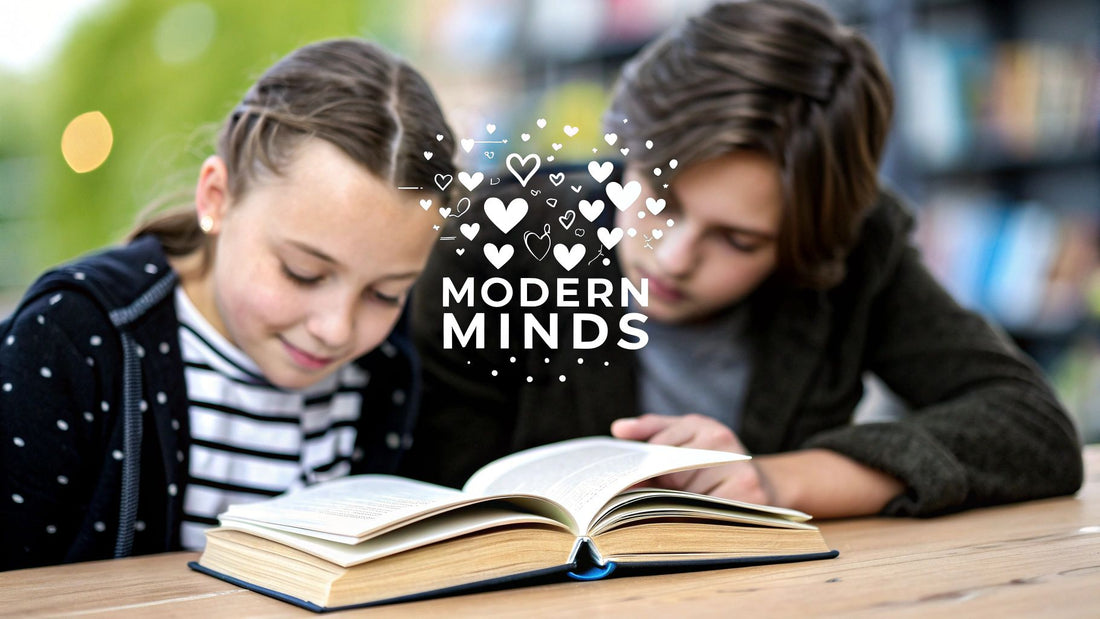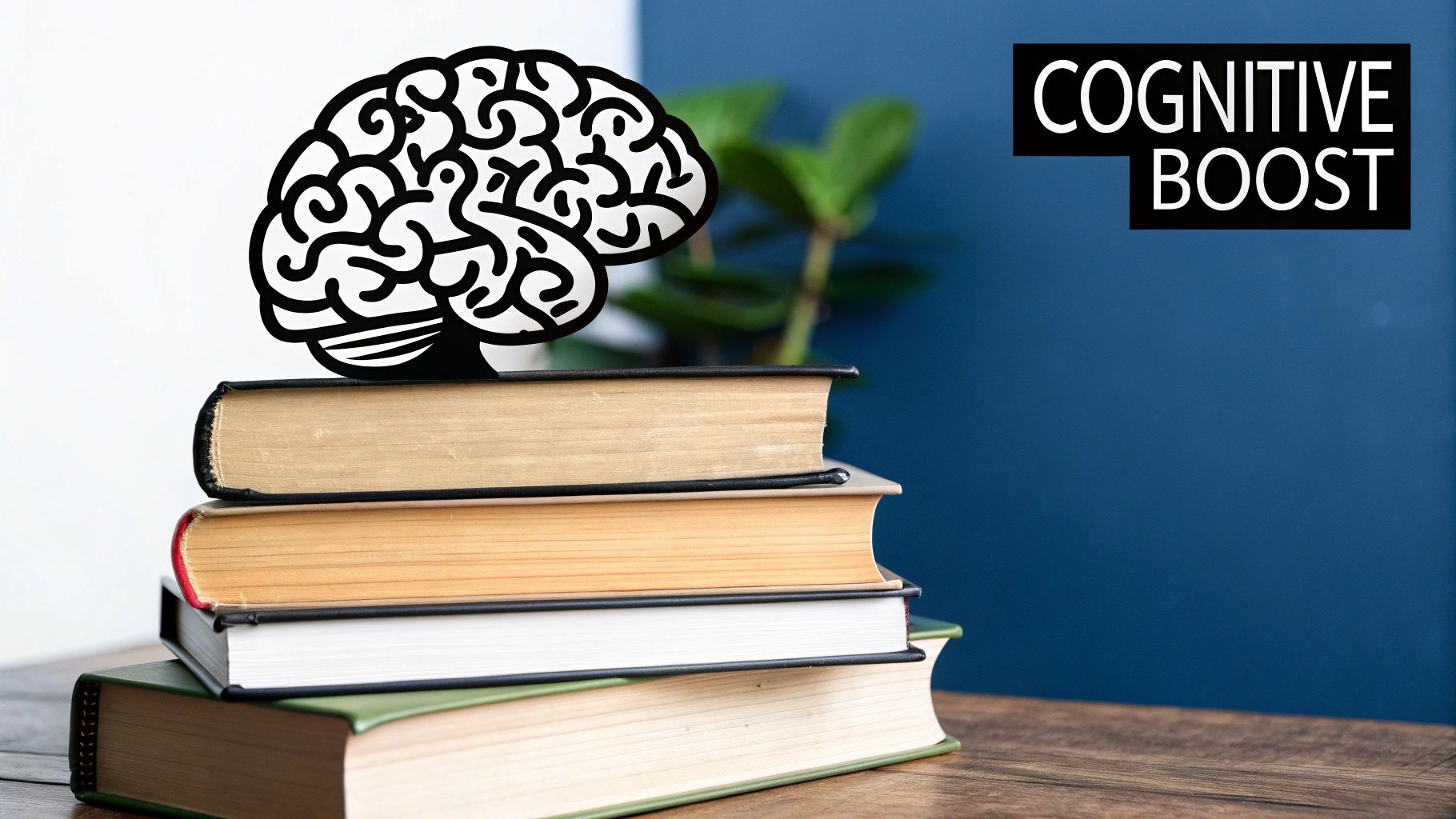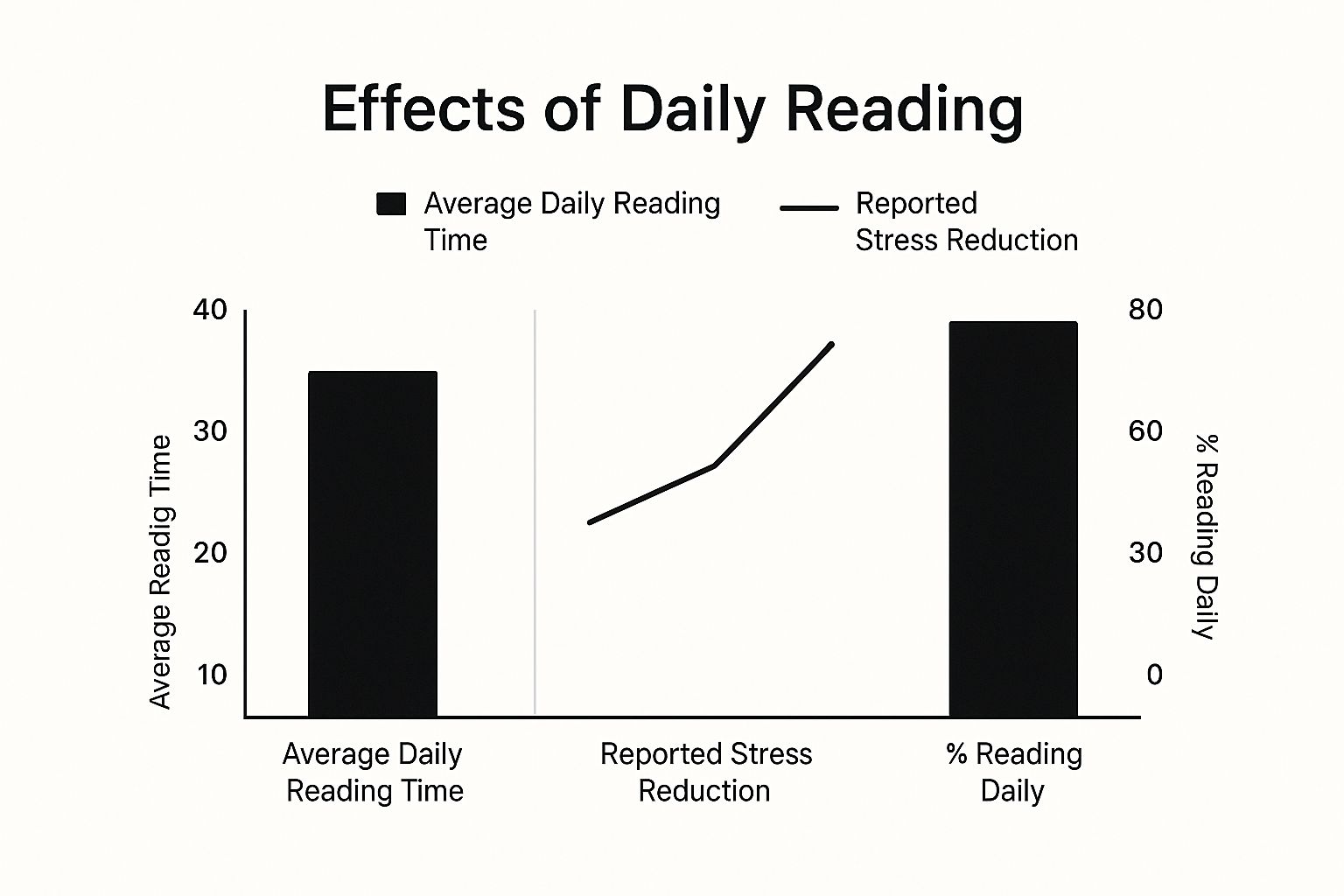
Why Reading Books Is Important for Modern Minds
Share
Picking up a book is one of the most powerful things we can do for ourselves. It’s a genuine act of self-care and a real workout for the mind.
In a world where we're constantly bombarded by digital noise, reading offers a much-needed refuge. It builds mental strength, emotional intelligence, and deep empathy in ways that mindlessly scrolling through a screen just can't.
Why Reading Is a Crucial Skill for Mental Wellbeing

With endless notifications pinging and the constant pressure of social media, the simple act of reading has become more vital than ever for our mental health. This is especially true for children and young people. Worryingly, around one in five children and young people in England now have a probable mental health condition, a fact which really shows how urgently we need simple, accessible tools to help them navigate their complex emotions. The rise of social media has been linked to increased feelings of anxiety and social pressure, making offline activities like reading even more crucial.
This is where books come in. They offer a quiet sanctuary. Unlike the fast-paced, often anxiety-inducing world of a social media feed, a book invites you to slow down, focus, and truly immerse yourself.
It gives you a space to disconnect from all the outside pressures and reconnect with your own thoughts. Even just losing yourself in a story for a few minutes a day can be a powerful way to relax, lowering stress and calming an overstimulated mind. For example, simply setting aside 15 minutes before bed with a book instead of a phone can help to reduce cortisol levels and prepare the brain for sleep.
Navigating Life's Challenges Through Stories
But reading isn't just about escaping; it's a way of making sense of the world. When a child reads about a character facing a tough situation, whether it's bullying or loss, they're learning how to cope with similar challenges in their own lives. For instance, a story about a character overcoming shyness can give a child practical ideas for making new friends.
Books almost become a safe simulator for life's hurdles, building up that all-important emotional resilience without the real-world risk. Addressing mental health openly from a young age is vital; it normalises conversations about feelings and equips children with the language to ask for help when they need it.
The cost of poor mental health is massive, not just for individuals but for society as a whole. UK businesses lose an estimated £53-£56 billion every single year because of issues like absenteeism and reduced productivity linked to mental health. By encouraging strong reading habits from a young age, we’re not just creating bookworms; we’re equipping the next generation with essential tools for their own wellbeing.
In this guide, we'll dive into the incredible benefits of reading. From strengthening the brain to nurturing empathy, we’ll uncover why picking up a book is one of the best investments you can make in your mental health. We'll also take a look at some brilliant mental health books and apparel designed to get these vital conversations started.
Important Disclaimer: While this article discusses mental wellbeing, I am not a mental health professional. The information provided is for educational purposes only. If you have concerns about your own or someone else's mental health, please consult a doctor or a qualified healthcare provider.
How Reading Strengthens Your Brain

Think of reading as a full-on workout for the brain. Scrolling through social media is more like a passive stroll, but getting lost in a book is a dynamic exercise, engaging multiple parts of your mind at once and building real mental muscle.
When you’re following a story, your brain is doing so much more than just decoding words. It’s building entire worlds from scratch, keeping track of complex plot twists, and piecing together the subtle motivations of each character. This mental gymnastics strengthens the connections in your brain, much like lifting weights builds muscle.
Reading gives us a quiet space to think, to feel, and to imagine. It builds the critical thinking and focus that are essential for navigating a complex world.
This is exactly why reading is so crucial for developing a sharp, focused mind. Unlike the short, disconnected bursts of information we get from our phones, a book requires your sustained attention. It trains your brain to concentrate for longer, a skill that's becoming incredibly rare—and valuable—in our world of constant distractions.
Building a Foundation for Lifelong Success
The mental benefits you get from reading regularly have a huge impact on real-world success. A child who reads often naturally becomes a better problem-solver, simply because they’re constantly analysing situations and predicting what might happen next in a story. They learn to see how cause and effect are woven together. For example, by following a detective in a mystery novel, a young reader learns to gather clues, assess evidence, and draw logical conclusions—skills directly applicable to schoolwork and life.
This consistent engagement with stories brings incredible results. A recent UK report found that children in structured reading programmes read an average of 20.7 books a year. That’s a massive jump from the median of just three books for UK adults. These kids also showed high levels of comprehension, even when tackling books well above their official reading age, proving just how much reading sharpens critical thinking.
The advantages don’t stop at the classroom door. The very skills reading hones—a stronger memory, sharp analytical thinking, and a richer vocabulary—are exactly what employers are looking for down the line. Investing time in reading truly is a long-term investment in your child's future.
Enhancing Focus and Concentration
Beyond just making your brain stronger, reading also cultivates a deeper ability to focus. The simple act of settling down with a book helps train your attention span, making it easier to concentrate on other important tasks in your life.
If you're looking to build this essential skill even further, there are plenty of practical approaches you can take. You can explore a range of strategies for improving concentration to help you reclaim your attention in a busy world. This commitment to focused activity is one of the most powerful reasons why reading is so important for people of all ages.
Reading as a Refuge for Mental Wellbeing

In a world buzzing with digital noise and endless notifications, books offer a quiet sanctuary for our minds. This is especially true for children and young people navigating an increasingly anxious world. The constant pressure from social media can feel overwhelming, but the simple act of opening a book provides a much-needed escape.
Stories give us a peaceful space to disconnect from all that external pressure and reconnect with ourselves. For a child, getting lost in a fictional world is a powerful form of relaxation, helping to lower stress and calm an overstimulated mind.
Building Empathy One Page at a Time
Reading isn't just about escaping; fiction is a brilliant tool for building empathy—that crucial ability to understand and share someone else's feelings. When a young reader steps into a character's shoes, they get to see the world from a completely different point of view.
They might learn how to navigate their own shyness by following a character who bravely makes a new friend. Or they might start to understand complex emotions like grief by seeing how a protagonist copes with loss. This whole process is fundamental to developing healthy social connections and emotional intelligence.
This is exactly why reading books is so important. It provides a safe, simulated space for children to process difficult feelings. They learn that their emotions are valid and, crucially, that they aren't alone in their experiences—a cornerstone of good mental health.
UK Reading Habits Across Different Demographics
Recent surveys into UK reading habits paint an interesting picture, showing how engagement can vary across different groups. This data really highlights the need for targeted initiatives to encourage reading for everyone, regardless of their background.
| Demographic Group | Percentage Who Have Read a Book in the Past Year |
|---|---|
| Children (5-10) | 78% |
| Teenagers (13-17) | 59% |
| Young Adults (18-24) | 64% |
| Women | 72% |
| Men | 61% |
| Higher Socioeconomic Group | 75% |
| Lower Socioeconomic Group | 55% |
The numbers show a clear drop-off in reading during the teenage years and a gap linked to socioeconomic status. It’s a reminder that we all have a role to play in making books accessible and appealing to young people from all walks of life.
Creating a Reading Sanctuary
To really get the most out of the calming benefits of reading, it helps to create a dedicated space for it. This doesn’t have to be anything elaborate; a cosy corner with good lighting and some comfy cushions can turn reading into a truly restorative ritual.
Creating a calm, comfortable environment makes a huge difference to the therapeutic benefits of reading. This idea is captured perfectly in Snuggyz Australia's comfort guide, which sets a scene of ultimate relaxation including 'a good book, and something soft'.
Here are a few simple relaxation tips to try:
- Mindful Minutes: Before you start, just take a few deep breaths to clear your mind.
- Limit Distractions: Pop phones and other devices on silent and, if you can, put them out of reach.
- Sensory Comfort: Adding a soft blanket or a warm drink can make the whole experience feel that much more soothing.
Sparking Important Conversations
Reading about mental health can also be a gentle way to open up important conversations. Books that explore themes like anxiety, sadness, or self-esteem can give children the words they need to talk about their own feelings. Examples include books like The Worrysaurus by Rachel Bright, which helps younger children understand anxiety, or Reasons to Stay Alive by Matt Haig for older readers.
Even something as simple as wearing mental health apparel, like a t-shirt with a positive message, can act as a conversation starter and help break down stigma. These simple tools can make talking about emotional wellbeing feel more approachable and normal. You can dive deeper into the power of reading mental health books and see how they can change our understanding of emotions.
A Gentle Reminder: It's wonderful to use books and other tools to support wellbeing, but I am not a mental health professional. If you are ever worried about your own or a child's mental health, it is always best to speak with a doctor or another qualified professional for guidance.
Understanding the UK’s Reading Decline
While it's wonderful to explore the personal joys of reading, we need to take a wider, more honest look at what’s happening across the UK. The reality is quite worrying. Far from being a cherished national pastime, reading for pleasure is in a sharp decline, particularly among children and young people.
This isn't just a minor shift in hobbies. This move away from books carries significant long-term costs, impacting everything from individual mental wellbeing to the nation's future economic health.
A huge part of the problem is the relentless pull of the digital world, especially social media. The instant hit of a short video or a scrolling feed is actively rewiring our attention spans. It makes the sustained, quiet focus needed to get lost in a book feel like hard work in comparison. We're seeing a fundamental change in how we, and especially our children, engage with information and entertainment.
The Alarming Statistics
The numbers really do paint a stark picture. The National Literacy Trust's annual survey shows that reading enjoyment among children is at its lowest point in two decades.
In their latest findings, just 32.7% of children and young people between 8 and 18 said they actually enjoyed reading in their free time. That’s a dramatic fall. Even more concerning is that fewer than one in five (18.7%) now read daily for pleasure. Socioeconomic factors also come into play here, with children from less advantaged backgrounds being less likely to pick up a book every day.
This data chart helps to visualise the connection between reading habits, daily time commitment, and reported stress reduction.

You can see a clear, direct link between the time someone spends reading and the positive impact it has on their wellbeing.
The Long-Term Societal Cost
This decline is far more than just an educational concern; it has serious consequences for our society as a whole. Lower literacy levels are directly linked to poorer mental health outcomes and reduced economic opportunities later in life.
When children don't build strong reading skills, they are simply less equipped to handle the complexities of being an adult. This can affect anything from understanding important health information to finding success in the workplace.
The cost of poor mental health to UK businesses is already estimated to be over £53 billion a year. Tackling the decline in reading is a crucial piece of the puzzle in addressing this wider issue. By encouraging a love for books, we are investing in a future generation that is more resilient, empathetic, and better prepared to thrive.
A Gentle Reminder: The statistics and challenges discussed here are serious, but they are not insurmountable. If you are ever worried about your own or a child's mental health, please remember to speak with a doctor or another qualified professional for guidance. I am not a mental health professional, and this advice is for educational purposes only.
How to Build a Lifelong Love of Reading
Understanding why reading is so good for our kids is one thing, but actually turning that knowledge into a real, lasting habit is the real challenge. The goal isn't to force them to read; it's about making stories a joyful and natural part of their world. It all starts by creating positive, totally pressure-free moments with books.
For the little ones, this often looks like a magical, consistent story time. Making reading a cosy, anticipated part of the day—snuggled up before bed, perhaps—forges a powerful emotional link to books. It teaches them that stories mean comfort, excitement, and connection.
As they get older, you can build on that foundation by connecting books to whatever they're already obsessed with. Is your teenager glued to their gaming console? Introduce them to an epic fantasy or a sprawling sci-fi novel. Are they passionate about making a difference in the world? Memoirs and stories exploring social justice will feel incredibly relevant and gripping.
Practical Steps to Nurture a Reading Habit
The secret is to make reading feel like a discovery, not a chore. One of the most powerful things you can do is simply lead by example. When kids see the adults in their lives genuinely enjoying a book, it sends a clear message: reading is a worthwhile, pleasurable thing to do.
Another amazing, and free, resource is your local library. Regular visits give children the freedom to wander the aisles and pick out books for themselves, which gives them a real sense of ownership over what they read.
Here are a few other ideas to get you started:
- Start a Family Book Club: Choose a book to read together and set aside a special time to chat about it, maybe over pizza or hot chocolate. It makes reading a shared experience.
- Embrace Technology: Audiobooks are a fantastic way to soak up stories during car journeys or while doing chores. E-readers can also be a big hit with tech-savvy kids.
- Explore Different Formats: Don't turn your nose up at graphic novels, comics, or magazines. Any reading that grabs their interest is a win, helping to build both fluency and confidence.
To keep that spark alive, platforms that offer captivating narratives, like lovable tales, can be a brilliant addition to your storytelling toolkit.
Stories That Heal and Help
Beyond simple entertainment, books can be a gentle way to open up conversations about big topics like mental health. When children read about characters navigating tricky emotions, it can give them the words and the confidence to talk about their own feelings.
To explore this idea further, you can learn more about the heartfelt reasons behind the creation of a children’s mental health book and its mission to support young minds.
A Gentle Reminder: Encouraging reading is a wonderful way to support a child’s wellbeing, but it is not a substitute for professional help. If you have any concerns about a child's mental health, please speak with a doctor or a qualified healthcare provider. I am not a medical professional, and this advice is for educational purposes.
Why Adults Need to Reclaim Reading
The incredible benefits of reading aren't just for children. In a life jam-packed with digital fatigue, demanding jobs, and never-ending to-do lists, picking up a book can feel like a luxury we simply can't afford. But what if we started seeing it not as another task, but as a vital act of self-care?
For adults, reading is an incredibly powerful way to find a bit of calm. Just a few minutes lost in a good story can lower stress levels, quieten a racing mind, and offer a much-needed escape from the day's pressures. It’s also a brilliant way to keep our minds sharp, engaged, and always learning.
Bridging the Reading Gap
However, some recent numbers paint a worrying picture for adults in the UK. A YouGov survey revealed that a staggering 40% of Britons didn't read or listen to a single book in the past year. The median number of books read was just three. This dip has real consequences, not just for our own wellbeing, but for the next generation who look to us as role models. You can explore the full findings of the UK reading survey to see the full picture.
When we make reading a priority, we show our children that it’s a valuable, enjoyable part of life. We create a home culture that values curiosity and quiet moments.
This article has explored why reading is so important, from boosting brainpower to nurturing empathy. The core message is simple: reading is a profound investment in yourself and in the world around you. It can even be a starting point for important conversations, just like how some use mental health apparel as a way to raise awareness.
So, pick up a book. It’s not an obligation, but an opportunity to reconnect with yourself, expand your world, and build a healthier mind.
A Final Gentle Reminder: This guide is for educational purposes. I am not a mental health professional. If you have concerns about your mental health, it is always best to seek advice from a doctor or another qualified healthcare provider.
Of course. Here is the rewritten section, adopting the specified human expert tone and voice.
Got Questions About Reading Habits?
It’s one thing to know how important reading is, but it’s another thing entirely to build that habit in our kids (and ourselves!). It can feel like a real uphill battle sometimes. Let’s tackle some of the most common hurdles with some practical, straightforward advice.
"My Child Finds Reading Boring. What Can I Do?"
This is a classic! The trick is to stop thinking of 'reading' as a separate, worthy activity and start connecting it to what they already love. If they're obsessed with a video game, hunt down a science fiction or fantasy novel with that same sense of adventure and world-building.
And don't underestimate the power of graphic novels. They're a brilliant gateway into brilliant storytelling.
The goal here is to make reading a shared, enjoyable experience, not just another chore on the list. Have a day out at a bookshop and let them have free rein to choose whatever catches their eye. Or, curl up together and listen to a gripping audiobook. Taking the pressure off and just focusing on the fun of the story can change everything.
"Are Audiobooks as Good as 'Real' Books?"
Yes, they absolutely are. The most important thing is that a child is engaging with stories and soaking up language. Audiobooks are fantastic for building listening skills and can be a lifeline for reluctant readers or kids with dyslexia, making incredible stories accessible to everyone.
While a few studies hint that we might remember slightly more from a physical book, the best format is always the one your child actually enjoys and uses consistently.
"How Can I Find Time to Read When We're So Busy?"
It’s all about starting small. Forget finding a whole hour – that’s an impossible task for most of us! Aim for just ten or fifteen minutes a day. That could be on the commute, in a waiting room, or just before bed instead of that last-minute phone scroll.
Audiobooks are also a game-changer for busy families. Pop one on while you're doing chores, cooking dinner, or on the school run. You'd be amazed how quickly those little pockets of time add up over a week.
At Little Fish Books, we believe in the power of stories to nurture young minds. Explore our collection of books, activities, and resources designed to help children understand their emotions and build a lifelong love of reading. Visit us today to discover tools for emotional wellbeing.
